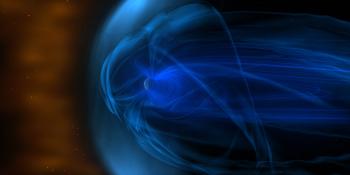Visualizzazione archivio di venerdì, 16 marzo AM
Rapporto attività solare
Ogni brillamento solare menzionato nel rapporto ha un fattore di scala, applicato dal Centro di Predizione Meteorologica Spaziale (SWPC). A causa del fattore di scala del SWPC, i brillamenti solari sono segnalati come ridotti del 42%, rispetto ai dati di qualità scientifica. Il fattore di scala è stato rimosso dai nostri dati archiviati sui brillamenti solari, per riflettere le unità fisiche reali.
Rapporto dell'Attività Geofisica Solare 2012 Mar 16 2200 UTCPreparati dal SWPC della NOAA© ed elaborati da SpaceWeatherLive.com
Rapporto Congiunto USAF/NOAA dell'Attività Solare e Geofisica
SDF Numero 076 Emesso alle 2200Z il Mar 16 2012IA. Analisi delle Regioni Solari Attive e Attività dalle 2100Z-15 alle 2100Z-16 Solar activity was low. Region 1432 (N14W25) produced
three C1/Sf flares during the period. This region decreased in area
and spot count, ending the day as a Eso type group with a beta-gamma
configuration. New Region 1436 (S12E62), a simple Axx type group,
was numbered today. SDO/AIA 171 imagery showed a filament erupted
from the northwest limb around 18Z.
IB. Previsione dell'Attività Solare
Solar activity is expected to be low
with a chance for another M-class flare.
IIA. Sommario dell'Attività Geofisica dalle 2100Z-15 alle 2100Z-16
The geomagnetic field ranged from unsettled to active levels as
effects from yesterdays CME impact began to wane. Solar wind speed
at the ACE spacecraft remained high, averaging about 660 km/s
through the period while Bz ranged from +5 to -5 nT. Data suggests
we may already be under the influence of a coronal hole high speed
stream. The greater than 2 MeV electron flux at geosynchronous orbit
reached high levels during the period.
IIB. Previsione dell'Attività Geofisica
The geomagnetic field is
expected to begin at unsettled to active levels with minor to major
storm periods at high latitudes for Day 1 (17 Mar). Days 2 and 3
(18-19 Mar) will see a return to predominantly active levels with
minor storm periods possible as an earth-directed CME from 15 Mar
arrives mid to late on the 18th. A glancing blow from a 14 Mar CME
is expected to precede the CME by about 12 hours. Major to severe
storm levels will be possible at high latitudes. The geomagnetic
field should return to active to unsettled levels late on Day 3 (19
Mar) as effects begin to wane.
III. Probabilità dell'Evento dalle Mar del 17 alle Mar del 19
| Classe M | 50% | 50% | 50% |
| Classe X | 10% | 10% | 10% |
| Protone | 20% | 15% | 15% |
| PCAF | green | ||
IV. Flusso di 10.7 cm di Penticton
Osservato 16 Mar 099 Previsto 17 Mar-19 Mar 105/105/105 Media di 90 Giorni 16 Mar 124
V. Indici Geomagnetici A
Osservato Afr/Ap 15 Mar 024/038 Stimato Afr/Ap 16 Mar 014/019 Previsto Afr/Ap 17 Mar-19 Mar 013/015-018/025-015/018
VI. Probabilità dell'Attività Geomagnetica dal 17 Mar al 19 Mar
| A. Latitudini Medie | |||
|---|---|---|---|
| Attivo | 15% | 40% | 30% |
| Tempesta minore | 05% | 20% | 15% |
| Tempesta maggiore-grave | 01% | 05% | 01% |
| B. Latitudini Alte | |||
|---|---|---|---|
| Attivo | 15% | 15% | 15% |
| Tempesta minore | 20% | 20% | 20% |
| Tempesta maggiore-grave | 20% | 25% | 15% |
Tutti gli orari in UTC
<< Vai alla pagina della panoramica giornaliera
Ultime notizie
Ultimi messaggi dal forum
2025/04/12-13 Filament CMEs 2025/04/16 G3 Watch 540Incoming & Unnumbered Active Regions 1762AR4064 16AR4062 45GLE. Ground Level Enhancements 12
Altri argomentiSupporta SpaceWeatherLive.com!
Molte persone vengono su SpaceWeatherLive per seguire l'attività del Sole o sapere se ci sia la possibilità di vedere l'aurora, ma a maggior traffico corrispondono costi maggiori. Considerate una donazione se vi piace SpaceWeatherLive così che possiamo mantenere online il sito web!

Notizie sul meteo spaziale
| Ultimo brillamento X | 2025/03/28 | X1.1 |
| Ultimo brillamento M | 2025/04/18 | M4.4 |
| Ultima tempesta geomagnetica | 2025/04/16 | Kp8- (G4) |
| Giorni senza macchie | |
|---|---|
| Ultimo giorno senza macchie | 2022/06/08 |
| Media mensile Numero di Macchie Solari | |
|---|---|
| marzo 2025 | 134.2 -20.4 |
| aprile 2025 | 120.5 -13.7 |
| Ultimi 30 giorni | 116.6 -25.7 |


